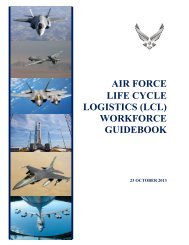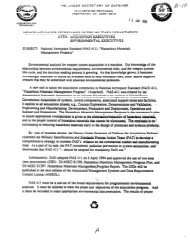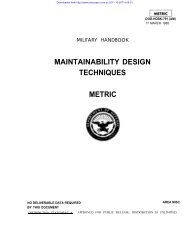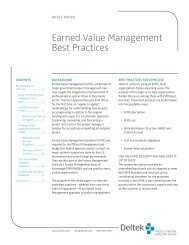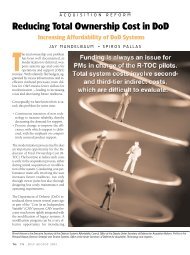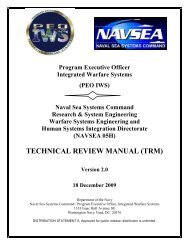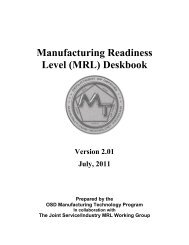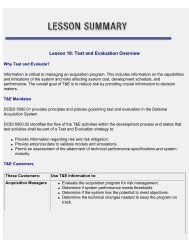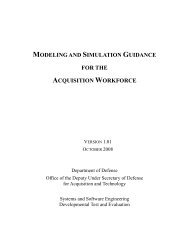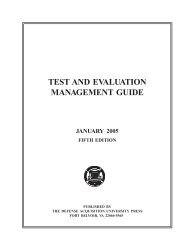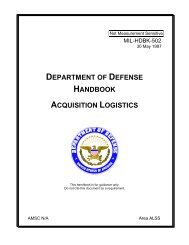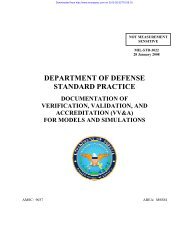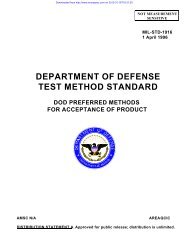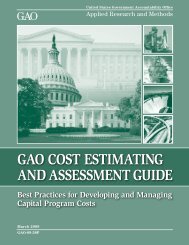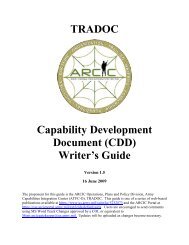- Page 1:
Joint Publication 1-02 Department o
- Page 4 and 5:
Preface 5. JP 1-02 Online Availabil
- Page 6 and 7:
Table of Contents Intentionally Bla
- Page 8 and 9:
As Amended Through 15 August 2011 c
- Page 10 and 11:
As Amended Through 15 August 2011 a
- Page 12 and 13:
As Amended Through 15 August 2011 a
- Page 14 and 15:
As Amended Through 15 August 2011 a
- Page 16 and 17:
As Amended Through 15 August 2011 a
- Page 18 and 19:
As Amended Through 15 August 2011 a
- Page 20 and 21:
As Amended Through 15 August 2011 a
- Page 22 and 23:
As Amended Through 15 August 2011 a
- Page 24 and 25:
As Amended Through 15 August 2011 p
- Page 26 and 27:
As Amended Through 15 August 2011 M
- Page 28 and 29:
As Amended Through 15 August 2011 a
- Page 30 and 31:
As Amended Through 15 August 2011 a
- Page 32 and 33:
As Amended Through 15 August 2011 A
- Page 34 and 35:
As Amended Through 15 August 2011 a
- Page 36 and 37:
As Amended Through 15 August 2011 a
- Page 38 and 39:
As Amended Through 15 August 2011 I
- Page 40 and 41:
As Amended Through 15 August 2011 b
- Page 42 and 43:
As Amended Through 15 August 2011 b
- Page 44 and 45:
As Amended Through 15 August 2011 b
- Page 46 and 47:
As Amended Through 15 August 2011 b
- Page 48 and 49:
As Amended Through 15 August 2011 h
- Page 50 and 51:
As Amended Through 15 August 2011 I
- Page 52 and 53:
As Amended Through 15 August 2011 c
- Page 54 and 55:
As Amended Through 15 August 2011 C
- Page 56 and 57:
As Amended Through 15 August 2011 e
- Page 58 and 59:
As Amended Through 15 August 2011 o
- Page 60 and 61:
As Amended Through 15 August 2011 c
- Page 62 and 63:
As Amended Through 15 August 2011 c
- Page 64 and 65:
As Amended Through 15 August 2011 w
- Page 66 and 67:
As Amended Through 15 August 2011 c
- Page 68 and 69:
As Amended Through 15 August 2011 c
- Page 70 and 71:
As Amended Through 15 August 2011 c
- Page 72 and 73:
As Amended Through 15 August 2011 c
- Page 74 and 75:
As Amended Through 15 August 2011 c
- Page 76 and 77:
As Amended Through 15 August 2011 c
- Page 78 and 79:
As Amended Through 15 August 2011 c
- Page 80 and 81:
As Amended Through 15 August 2011 c
- Page 82 and 83:
As Amended Through 15 August 2011 f
- Page 84 and 85:
As Amended Through 15 August 2011 c
- Page 86 and 87:
As Amended Through 15 August 2011 a
- Page 88 and 89:
As Amended Through 15 August 2011 c
- Page 90 and 91:
As Amended Through 15 August 2011 r
- Page 92 and 93:
As Amended Through 15 August 2011 o
- Page 94 and 95:
As Amended Through 15 August 2011 w
- Page 96 and 97:
As Amended Through 15 August 2011 I
- Page 98 and 99:
As Amended Through 15 August 2011 d
- Page 100 and 101:
As Amended Through 15 August 2011 o
- Page 102 and 103:
As Amended Through 15 August 2011 d
- Page 104 and 105:
As Amended Through 15 August 2011 d
- Page 106 and 107:
As Amended Through 15 August 2011 D
- Page 108 and 109:
As Amended Through 15 August 2011 d
- Page 110 and 111:
As Amended Through 15 August 2011 d
- Page 112 and 113:
As Amended Through 15 August 2011 i
- Page 114 and 115:
As Amended Through 15 August 2011 d
- Page 116 and 117:
As Amended Through 15 August 2011 d
- Page 118 and 119:
As Amended Through 15 August 2011 e
- Page 120 and 121:
As Amended Through 15 August 2011 e
- Page 122 and 123:
As Amended Through 15 August 2011 e
- Page 124 and 125:
As Amended Through 15 August 2011 i
- Page 126 and 127:
As Amended Through 15 August 2011 e
- Page 128 and 129:
As Amended Through 15 August 2011 p
- Page 130 and 131:
As Amended Through 15 August 2011 i
- Page 132 and 133:
As Amended Through 15 August 2011 e
- Page 134 and 135:
As Amended Through 15 August 2011 f
- Page 136 and 137:
As Amended Through 15 August 2011 f
- Page 138 and 139:
As Amended Through 15 August 2011 v
- Page 140 and 141:
As Amended Through 15 August 2011 f
- Page 142 and 143:
As Amended Through 15 August 2011 t
- Page 144 and 145:
As Amended Through 15 August 2011 t
- Page 146 and 147:
As Amended Through 15 August 2011 f
- Page 148 and 149:
As Amended Through 15 August 2011 I
- Page 150 and 151:
As Amended Through 15 August 2011 g
- Page 152 and 153:
As Amended Through 15 August 2011 G
- Page 154 and 155:
As Amended Through 15 August 2011 U
- Page 156 and 157:
As Amended Through 15 August 2011 g
- Page 158 and 159:
As Amended Through 15 August 2011 h
- Page 160 and 161:
As Amended Through 15 August 2011 h
- Page 162 and 163:
As Amended Through 15 August 2011 h
- Page 164 and 165:
As Amended Through 15 August 2011 h
- Page 166 and 167:
As Amended Through 15 August 2011 1
- Page 168 and 169:
As Amended Through 15 August 2011 e
- Page 170 and 171:
As Amended Through 15 August 2011 o
- Page 172 and 173:
As Amended Through 15 August 2011 m
- Page 174 and 175:
As Amended Through 15 August 2011 i
- Page 176 and 177:
As Amended Through 15 August 2011 m
- Page 178 and 179:
As Amended Through 15 August 2011 i
- Page 180 and 181:
As Amended Through 15 August 2011 i
- Page 182 and 183:
As Amended Through 15 August 2011 i
- Page 184 and 185:
As Amended Through 15 August 2011 I
- Page 186 and 187:
As Amended Through 15 August 2011 i
- Page 188 and 189:
As Amended Through 15 August 2011 j
- Page 190 and 191:
As Amended Through 15 August 2011 J
- Page 192 and 193: As Amended Through 15 August 2011 j
- Page 194 and 195: As Amended Through 15 August 2011 j
- Page 196 and 197: As Amended Through 15 August 2011 j
- Page 198 and 199: As Amended Through 15 August 2011 p
- Page 200 and 201: As Amended Through 15 August 2011 c
- Page 202 and 203: As Amended Through 15 August 2011 e
- Page 204 and 205: As Amended Through 15 August 2011 I
- Page 206 and 207: As Amended Through 15 August 2011 l
- Page 208 and 209: As Amended Through 15 August 2011 l
- Page 210 and 211: As Amended Through 15 August 2011 b
- Page 212 and 213: As Amended Through 15 August 2011 l
- Page 214 and 215: As Amended Through 15 August 2011 2
- Page 216 and 217: As Amended Through 15 August 2011 m
- Page 218 and 219: As Amended Through 15 August 2011 m
- Page 220 and 221: As Amended Through 15 August 2011 m
- Page 222 and 223: As Amended Through 15 August 2011 t
- Page 224 and 225: As Amended Through 15 August 2011 s
- Page 226 and 227: As Amended Through 15 August 2011 f
- Page 228 and 229: As Amended Through 15 August 2011 M
- Page 230 and 231: As Amended Through 15 August 2011 m
- Page 232 and 233: As Amended Through 15 August 2011 m
- Page 234 and 235: As Amended Through 15 August 2011 m
- Page 236 and 237: As Amended Through 15 August 2011 m
- Page 238 and 239: As Amended Through 15 August 2011 m
- Page 240 and 241: As Amended Through 15 August 2011 c
- Page 244 and 245: As Amended Through 15 August 2011 l
- Page 246 and 247: As Amended Through 15 August 2011 c
- Page 248 and 249: As Amended Through 15 August 2011 n
- Page 250 and 251: As Amended Through 15 August 2011 n
- Page 252 and 253: As Amended Through 15 August 2011 n
- Page 254 and 255: As Amended Through 15 August 2011 I
- Page 256 and 257: As Amended Through 15 August 2011 o
- Page 258 and 259: As Amended Through 15 August 2011 o
- Page 260 and 261: As Amended Through 15 August 2011 c
- Page 262 and 263: As Amended Through 15 August 2011 t
- Page 264 and 265: As Amended Through 15 August 2011 t
- Page 266 and 267: As Amended Through 15 August 2011 I
- Page 268 and 269: As Amended Through 15 August 2011 p
- Page 270 and 271: As Amended Through 15 August 2011 p
- Page 272 and 273: As Amended Through 15 August 2011 p
- Page 274 and 275: As Amended Through 15 August 2011 c
- Page 276 and 277: As Amended Through 15 August 2011 p
- Page 278 and 279: As Amended Through 15 August 2011 p
- Page 280 and 281: As Amended Through 15 August 2011 p
- Page 282 and 283: As Amended Through 15 August 2011 p
- Page 284 and 285: As Amended Through 15 August 2011 p
- Page 286 and 287: As Amended Through 15 August 2011 a
- Page 288 and 289: As Amended Through 15 August 2011 I
- Page 290 and 291: As Amended Through 15 August 2011 r
- Page 292 and 293:
As Amended Through 15 August 2011
- Page 294 and 295:
As Amended Through 15 August 2011 r
- Page 296 and 297:
As Amended Through 15 August 2011 r
- Page 298 and 299:
As Amended Through 15 August 2011 r
- Page 300 and 301:
As Amended Through 15 August 2011 r
- Page 302 and 303:
As Amended Through 15 August 2011 r
- Page 304 and 305:
As Amended Through 15 August 2011 r
- Page 306 and 307:
As Amended Through 15 August 2011 o
- Page 308 and 309:
As Amended Through 15 August 2011 s
- Page 310 and 311:
As Amended Through 15 August 2011 s
- Page 312 and 313:
As Amended Through 15 August 2011 s
- Page 314 and 315:
As Amended Through 15 August 2011 s
- Page 316 and 317:
As Amended Through 15 August 2011 s
- Page 318 and 319:
As Amended Through 15 August 2011 S
- Page 320 and 321:
As Amended Through 15 August 2011 s
- Page 322 and 323:
As Amended Through 15 August 2011 s
- Page 324 and 325:
As Amended Through 15 August 2011 s
- Page 326 and 327:
As Amended Through 15 August 2011 s
- Page 328 and 329:
As Amended Through 15 August 2011 s
- Page 330 and 331:
As Amended Through 15 August 2011 s
- Page 332 and 333:
As Amended Through 15 August 2011 t
- Page 334 and 335:
As Amended Through 15 August 2011 s
- Page 336 and 337:
As Amended Through 15 August 2011 s
- Page 338 and 339:
As Amended Through 15 August 2011 s
- Page 340 and 341:
As Amended Through 15 August 2011 I
- Page 342 and 343:
As Amended Through 15 August 2011 t
- Page 344 and 345:
As Amended Through 15 August 2011 t
- Page 346 and 347:
As Amended Through 15 August 2011 t
- Page 348 and 349:
As Amended Through 15 August 2011 d
- Page 350 and 351:
As Amended Through 15 August 2011 u
- Page 352 and 353:
As Amended Through 15 August 2011 t
- Page 354 and 355:
As Amended Through 15 August 2011 t
- Page 356 and 357:
As Amended Through 15 August 2011 c
- Page 358 and 359:
As Amended Through 15 August 2011 c
- Page 360 and 361:
As Amended Through 15 August 2011 t
- Page 362 and 363:
As Amended Through 15 August 2011 t
- Page 364 and 365:
As Amended Through 15 August 2011 s
- Page 366 and 367:
As Amended Through 15 August 2011 c
- Page 368 and 369:
As Amended Through 15 August 2011 u
- Page 370 and 371:
As Amended Through 15 August 2011 v
- Page 372 and 373:
As Amended Through 15 August 2011 u
- Page 374 and 375:
As Amended Through 15 August 2011 w
- Page 376 and 377:
As Amended Through 15 August 2011 w
- Page 378 and 379:
As Amended Through 15 August 2011 v
- Page 380 and 381:
As Amended Through 15 August 2011 I
- Page 382 and 383:
As Amended Through 15 August 2011 I
- Page 384 and 385:
As Amended Through 15 August 2011 I
- Page 386 and 387:
Appendix A As Amended Through 15 Au
- Page 388 and 389:
Appendix A As Amended Through 15 Au
- Page 390 and 391:
Appendix A As Amended Through 15 Au
- Page 392 and 393:
Appendix A As Amended Through 15 Au
- Page 394 and 395:
Appendix A As Amended Through 15 Au
- Page 396 and 397:
Appendix A As Amended Through 15 Au
- Page 398 and 399:
Appendix A As Amended Through 15 Au
- Page 400 and 401:
Appendix A As Amended Through 15 Au
- Page 402 and 403:
Appendix A As Amended Through 15 Au
- Page 404 and 405:
Appendix A As Amended Through 15 Au
- Page 406 and 407:
Appendix A As Amended Through 15 Au
- Page 408 and 409:
Appendix A As Amended Through 15 Au
- Page 410 and 411:
Appendix A As Amended Through 15 Au
- Page 412 and 413:
Appendix A As Amended Through 15 Au
- Page 414 and 415:
Appendix A As Amended Through 15 Au
- Page 416 and 417:
Appendix A As Amended Through 15 Au
- Page 418 and 419:
Appendix A As Amended Through 15 Au
- Page 420 and 421:
Appendix A As Amended Through 15 Au
- Page 422 and 423:
Appendix A As Amended Through 15 Au
- Page 424 and 425:
Appendix A As Amended Through 15 Au
- Page 426 and 427:
Appendix A As Amended Through 15 Au
- Page 428 and 429:
Appendix A As Amended Through 15 Au
- Page 430 and 431:
Appendix A As Amended Through 15 Au
- Page 432 and 433:
Appendix A As Amended Through 15 Au
- Page 434 and 435:
Appendix A As Amended Through 15 Au
- Page 436 and 437:
Appendix A As Amended Through 15 Au
- Page 438 and 439:
Appendix A As Amended Through 15 Au
- Page 440 and 441:
Appendix A As Amended Through 15 Au
- Page 442 and 443:
Appendix A As Amended Through 15 Au
- Page 444 and 445:
Appendix A As Amended Through 15 Au
- Page 446 and 447:
Appendix A As Amended Through 15 Au
- Page 448 and 449:
Appendix A As Amended Through 15 Au
- Page 450 and 451:
Appendix A As Amended Through 15 Au
- Page 452 and 453:
Appendix A As Amended Through 15 Au
- Page 454 and 455:
Appendix A As Amended Through 15 Au
- Page 456 and 457:
Appendix A As Amended Through 15 Au
- Page 458 and 459:
Appendix A As Amended Through 15 Au
- Page 460 and 461:
Appendix A As Amended Through 15 Au
- Page 462 and 463:
Appendix A As Amended Through 15 Au
- Page 464 and 465:
Appendix A As Amended Through 15 Au
- Page 466 and 467:
Appendix A As Amended Through 15 Au
- Page 468 and 469:
Appendix A As Amended Through 15 Au
- Page 470 and 471:
Appendix A As Amended Through 15 Au
- Page 472 and 473:
Appendix A As Amended Through 15 Au
- Page 474 and 475:
Appendix A As Amended Through 15 Au
- Page 476 and 477:
Appendix A As Amended Through 15 Au
- Page 478 and 479:
Appendix A As Amended Through 15 Au
- Page 480 and 481:
Appendix A As Amended Through 15 Au
- Page 482 and 483:
Appendix A As Amended Through 15 Au
- Page 484 and 485:
Appendix A As Amended Through 15 Au
- Page 486 and 487:
Appendix A As Amended Through 15 Au
- Page 488 and 489:
Appendix A As Amended Through 15 Au
- Page 490 and 491:
Appendix A As Amended Through 15 Au
- Page 492 and 493:
Appendix A As Amended Through 15 Au
- Page 494 and 495:
Appendix A As Amended Through 15 Au
- Page 496 and 497:
Appendix A As Amended Through 15 Au
- Page 498 and 499:
Appendix A As Amended Through 15 Au
- Page 500 and 501:
Appendix A As Amended Through 15 Au
- Page 502 and 503:
Appendix A As Amended Through 15 Au
- Page 504 and 505:
Appendix A As Amended Through 15 Au
- Page 506 and 507:
Appendix A As Amended Through 15 Au
- Page 508 and 509:
Appendix A As Amended Through 15 Au
- Page 510 and 511:
Appendix A As Amended Through 15 Au
- Page 512 and 513:
Appendix A As Amended Through 15 Au
- Page 514 and 515:
Appendix A As Amended Through 15 Au
- Page 516 and 517:
Appendix A As Amended Through 15 Au
- Page 518 and 519:
Appendix A As Amended Through 15 Au
- Page 520 and 521:
Appendix A As Amended Through 15 Au
- Page 522 and 523:
Appendix A As Amended Through 15 Au
- Page 524 and 525:
Appendix A As Amended Through 15 Au
- Page 526 and 527:
Appendix A As Amended Through 15 Au
- Page 528 and 529:
Appendix A As Amended Through 15 Au
- Page 530 and 531:
Appendix A As Amended Through 15 Au
- Page 532 and 533:
Appendix A As Amended Through 15 Au
- Page 534 and 535:
Appendix A As Amended Through 15 Au
- Page 536 and 537:
Appendix A As Amended Through 15 Au
- Page 538 and 539:
Appendix A As Amended Through 15 Au
- Page 540 and 541:
Appendix A As Amended Through 15 Au
- Page 542 and 543:
Appendix A As Amended Through 15 Au
- Page 544 and 545:
Appendix A As Amended Through 15 Au
- Page 546 and 547:
Appendix A As Amended Through 15 Au
- Page 548 and 549:
Appendix A As Amended Through 15 Au
- Page 550 and 551:
Appendix A As Amended Through 15 Au
- Page 552:
Appendix B As Amended Through 15 Au



